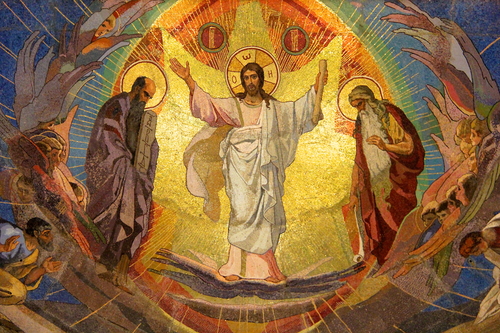Repented – and Still Repenting – Jonah 2:8-9 – February 12 2021
/0 Comments/in Enduring Words for Troubled Times/by David GuzikWas the American Revolution Justified? – Q&A for February 11, 2021
/0 Comments/in Q&A Transcripts/by David GuzikResisting and Receiving – James 1:19-21 – February 11 2021
/0 Comments/in Enduring Words for Troubled Times/by David GuzikEarnest Prayer – Acts 12:5 – February 10 2021
/0 Comments/in Enduring Words for Troubled Times/by David GuzikPerfect Logic – 2 Kings 7:3-4 – February 09 2021
/0 Comments/in Enduring Words for Troubled Times/by David GuzikAdam’s Fall and Our Fall – Romans 5:12 – February 08 2021
/0 Comments/in Enduring Words for Troubled Times/by David GuzikIn Jesus’ Name
/0 Comments/in Weekly Devotional/by David GuzikAnd His name, through faith in His name, has made this man strong, whom you see and know. Yes, the faith which comes through Him has given him this perfect soundness in the presence of you all. (Acts 3:16)
As Peter preached to the excited crowd, he felt that he had to explain to them how the man was actually healed. After all, here was a man who was probably a well-known beggar at the temple courts. We don’t know if he was well-liked, but after begging in the same place for many years, he was probably well-known. When the one who could not walk was now walking, leaping, and praising God (Acts 3:8), it demanded an explanation.

Peter told them how the man was healed – in the name of Jesus: His name, through faith in His name, has made this man strong. Peter said that it was in the name of Jesus that this man has been made whole. Jesus was the reason he could walk, jump, and praise God.
To say, through faith in His name means more than that Peter said the words, “in Jesus’ name.” Many people have the custom of ending their prayer with the words, “in Jesus’ name.” This is based on the promise Jesus made recorded in John 14:13-14: And whatever you ask in My name, that I will do, that the Father may be glorified in the Son. If you ask anything in My name, I will do it.
But to do something “in Jesus’ name” means far more than to say those words at the end of our prayer. For Peter, it meant that he consciously did this (Acts 3:1-7) in the authority and power of Jesus, not in the authority and power of Peter. In fact, Peter would not even take credit for the faith that was exercised in the healing (yes, the faith which comes through Him has given him this perfect soundness).
In Biblical thinking, a name isn’t just something that you call someone. The name can express a person’s nature or character. There is a sense in which the power of a person is present in their name, and their character is available in the name of the person.
Peter insisted that this amazing miracle was done through faith in His name. This should be a pattern for us in our life for God. When we, as God’s people, really do good in this world, we should do it through faith in His name. We are always tempted to do things trusting in something or someone else.
– We often trust in good intentions.
– We often trust in talents and gifts.
– We often trust in material resources.
– We often trust in reputation and prior success.
– We often trust in hard work or smart work.
Instead, we must always trust in and do good through faith in His name.
Today, make a choice: to live in do good in Jesus’ name, not your own.
El Autor de la vida
/0 Comments/in Devocional Semanal/by David GuzikMas vosotros negasteis al Santo y al Justo, y pedisteis que se os diese un homicida, y matasteis al Autor de la vida, a quien Dios ha resucitado de los muertos, de lo cual nosotros somos testigos. (Hechos 3:14-15)
Vemos muchas cosas notables en estos dos versículos del sermón de Pedro a la multitud emocionada en los patios del templo.
Vemos que Pedro reconoció a Jesús como Dios. Cuando Pedro se refirió a Jesús como Santo, fue una forma de exaltar a Jesús como Dios. El término Santo se usa más de 40 veces en el antiguo testamento como título glorioso y honrado para Yahveh, el Dios del pacto de Israel.

Vemos que Pedro habló con valentía a sus oidores de su pecado. Pedro les dijo que habían rechazado a Jesús, y pedisteis que se os diese un homicida. Una de las ironías de la crucifixión de Jesús es que mientras la multitud rechazó a Jesús, recibieron a un criminal y asesino llamado Barrabás (Lucas 23:12-25, Juan 18:39-40). Pedro confrontó a esta audiencia con valentía.
Vemos que Pedro predicó de una manera personal. En este sermón (Hechos 3:12-26), usó la palabra vosotros y se refirió a ellos al menos 11 veces. Quería que su mensaje llegara al corazón de cada persona de una manera personal y no temía hablar directamente a todos.
Vemos que Pedro sabía que Jesús era el Autor de la vida. ¡Qué título tan maravilloso para nuestro Salvador! Solo Jesús recibe este título glorioso. Significa que Jesús mismo es la autoridad, el gobernante, sobre toda la vida.
Es una verdad maravillosa que debemos proclamar: Jesucristo es el Autor de la vida. Esto es verdad porque Jesús tiene vida como nadie más la tiene; nadie podía quitarle la vida; Él tuvo que rendirla (Juan 10:17-18). Esto es verdad porque Jesús ganó vida para su pueblo; no solo para Él mismo, sino también para su pueblo. Esto es verdad porque Jesús da vida en abundancia, el Autor de la vida puede dar vida. Esto es verdad porque Jesús sostiene nuestra vida y gobierna la vida. ¡En todo sentido, Jesús es el Autor de la vida!
Considera la dura verdad con la que Pedro confrontó a sus oyentes: ellos mataron al Autor de la vida. En un aspecto, esto es un ultraje: matando a Aquel que es el autor y gobernante de la vida misma. Por otro lado, es una imposibilidad, porque ¿qué le puede hacer la muerte al Autor de la vida? Aquel que gobierna la vida nunca puede ser perjudicado por la muerte. El intento del hombre de matar a Jesús fue tanto un terrible pecado como una imposibilidad tonta, porque Jesús es Aquel a quien Dios ha resucitado de los muertos.
Por supuesto, el Autor de la vida no podía permanecer en la tumba, y los apóstoles fueron testigos del hecho de su resurrección.
Los testigos comprueban el hecho: Jesús es el Autor de la vida. ¿Es Él el autor y monarca sobre tu vida?
Haz clic aquí para el comentario de David de Hechos 3
Der Fürst des Lebens
/0 Comments/in Wöchentliche Andacht/by David GuzikIhr habt den Heiligen und Gerechten verleugnet und verlangt, daß euch ein Mörder geschenkt werde; den Fürsten des Lebens aber habt ihr getötet! Ihn hat Gott aus den Toten auferweckt; dafür sind wir Zeugen. (Apostelgeschichte 3,14-15)
In diesen zwei Versen aus Petrus Predigt zu der aufgeregten Menschenmenge im Tempelhof sehen wir viele bemerkenswerte Dinge.
Wir sehen, dass Petrus Jesus als Gott erkannt hatte. Als Petrus über Jesus als den Heiligen sprach, erhöhte er damit Jesus zu Gott. Der Ausdruck der Heilige wird im Alten Testament über 40 Mal als herrlicher Titel für Jahwe, den Gott Israels, gebraucht.

Wir sehen, dass Petrus den Hörern ihre Sünde deutlich macht. Petrus sagte ihnen, dass sie Jesus abgelehnt hatten und verlangt hatten, dass ihnen ein Mörder geschenkt werde. Es ist schon ironisch, dass das Volk Jesus kreuzigen ließ und einen Mörder namens Barabbas begnadigte (Lukas 23,13-25, Johannes 18,39-40). Petrus konfrontierte seine Zuhörer damit.
Wir sehen, dass Petrus seine Predigt persönlich machte. In dieser Predigt im Hof des Tempels (Apostelgeschichte 3,12-26) benutzte er das Wort ihr mindestens 11 Mal. Er wollte, dass sein Botschaft sie auf persönliche Weise traf, und er hatte keine Angst davor die Leute direkt anzusprechen.
Wir sehen, dass Petrus wusste, dass Jesus der Fürst des Lebens ist. Was für ein wunderbarer Titel für unseren Erlöser! Nur Jesus gebührt dieser herrlicher Titel. Er bedeutet, dass Jesus die Autorität und der Herrscher über alles Leben ist.
Es ist eine wunderbare Wahrheit – Jesus ist der Fürst des Lebens. Das ist wahr, denn Jesus hat das Leben wie niemand sonst; niemand kann Sein Leben nehmen – Er gab Sein Leben für uns (Johannes 10,17-18). Das ist wahr, denn Jesus gewann das Leben für Seine Kinder – nicht nur für sich selbst, sondern für Sein Volk. Das ist wahr, denn Jesus schenkt uns überfließendes Leben – der Fürst des Lebens kann Leben schenken. Das ist wahr, denn Jesus erhält Leben, und er regiert über das Leben. In jeder Hinsicht ist Jesus der Fürst des Lebens!
Beachte die harte Wahrheit, mit der Petrus seine Zuhörer konfrontierte: sie töteten den Fürst des Lebens. Einerseits ist das ein Skandal – sie töteten den Einen, der der Autor und Herrscher des Lebens selbst ist. Andererseits ist es eine Unmöglichkeit, denn was kann der Tod dem Fürst des Lebens anhaben? Ihm, der über das Leben herrscht, kann der Tod nichts antun. Der Versuch der Menschen, Jesus zu töten, war sowohl eine skandalöse Sünde und eine närrische Unmöglichkeit, denn Jesus ist der Eine, den Gott aus den Toten auferweckt hat.
Natürlich konnte der Fürst des Lebens nicht im Grab bleiben, und die Apostel waren Zeugen Seiner Auferstehung.
Die Zeugen beweisen die Tatsache – Jesus ist der Fürst des Lebens. Ist Er der Herrscher und König über dein Leben?




